- Home
- Raymond Benson
Blues in the Dark Page 5
Blues in the Dark Read online
Page 5
Stormglove’s headquarters was a no-frills establishment. There was no front office receptionist. It was just a big room where Karissa and Marcello usually sat at separate desks. The only other spaces were a smaller conference room, which contained a coffee machine and a miniature fridge, and the unisex bathroom.
First thing that morning, Karissa brought in preliminary research materials and laid them out on the conference room table, where the couple had decided to brainstorm.
“What’s all this?” Marcello asked.
“Biographical material on Blair Kendrick. I think I’ve already outlined the opening scene. She comes to Hollywood all bright-eyed, lucks out in an audition for Ultimate Pictures, strikes the fancy of studio head Eldon Hirsch, and is on her way to be a big star.”
“The bloodshed obviously comes later, I guess. Karissa, I don’t know. Why would we want to make a movie about a white actress who was a flash in the pan and was murdered?”
“I don’t know yet, Marcello. That’s why we need to keep digging and find out what really happened. I’ve barely scratched the surface just searching for stuff on Google. Don’t you find it strange that there’s not much out there about the murder? Or murders, if you believe some of the stories. They claim studio fixer Buddy Franco was maybe Hirsch’s killer and possibly hers, too.”
“There’s not much out there probably because the police never solved the case. It went cold.”
“I think I might have found something else about Blair Kendrick’s story. Look here.” She opened a folder and took out the photograph of Blair and the elegant, handsome black man. “Do you know who this is, by any chance?”
Marcello took the picture and stared at it. His brow wrinkled, and he said, “I think he looks familiar … shit, who is that?”
“Well, there are dozens of photographs of that man among Blair’s belongings. In most of the shots, they look like they’re awfully fond of each other. Look at their body language in the photo. Here are some more.” She laid out four more pictures on the table. “What’s the first thing you would say about the two people in those photographs?”
“That they look like costars. Actors in a movie. Or a stage show.”
“But these two”—she pointed—“are not professional photos. They’re candids. Taken with a home camera. Look at the way he’s holding her hand. Marcello, I think Blair was dating a black man. I want to know who he is.”
Marcello rubbed his chin. “Well, if she was messing around with a brotha back then, I don’t think she would’ve taken him home—they would’ve lynched him.”
“But what if they were a couple? An interracial relationship in the forties. There could be something of a story for us here.”
“She wouldn’t have been allowed to date a black man, Karissa. The Production Code was still in effect. It was taboo. Actors had clauses in their contracts that forbade anything that was considered immoral. They must have been colleagues in something, not lovers.”
“Marcello, there are too many pictures at my house for them to just be colleagues. We need to find out who he is. Come on, you know I have good instincts for a story. All I’m saying is we should find out more. You going to help me or not?”
He studied the picture again. “You know, he’s probably a musician. I mean, he’s sitting at a piano in that one.” His eyes abruptly widened. “Wait a second. I remember!” He grabbed his phone and opened a browser.
“Who is it?”
“Hold on …” He thumbed the keypad and brought up a page with photos. “Yep, I was right. That’s Hank Marley.”
“Who?”
“Hank Marley.” He paraphrased the description online. “A jazz musician from St. Louis who had his own band in Los Angeles in the late forties. He was going places, too, but, let’s see …. Yep. He disappeared. Mysteriously vanished. Suspected of being murdered. He wasn’t active very long. Says, ‘What promised to be a stellar career was tragically cut short by Marley’s sudden disappearance in 1949.’”
“Forty-nine again. That year keeps coming up in this story. Marcello, we need to find out more! There’s something here, I know it. We’re uncovering something dramatic. Who can we ask about him?”
Marcello rubbed his chin and gave her back the photos. “Why don’t I talk to some of my boys who play down at the World Stage on Friday? There’s one guy who’s pretty old. Maybe he knows something.”
“The World Stage? The jazz club?”
“Yeah, it’s not too far from where you’re living.”
“Angelina will let you go out late at night?” she teased.
“My wife won’t have a problem with me going out and socializing if it’s business, you know that. She might even want to come.”
She paused, then raised her eyebrows at him. He cocked his head. “What, you want to go, too?”
7
THE MOVIE
A montage of scenes from a Hollywood premiere—limousines, stars in tuxedos and evening gowns, bright lights, photographers … and Blair Kendrick smiling and gushing for the press as she enters the theater. The voice-over begins …
“A Kiss in the Night opened to the public in late January of 1947 and was a box office hit. Most of the reviews singled me out as the best thing in the picture. Columnist Hedda Hopper came out from one of those huge hats she wears to write, ‘Newcomer Blair Kendrick is a spitfire. I wouldn’t want to get on her bad side.’ Her rival in the gossip trade in Hollywood, Louella Parsons, also mentioned me by saying, ‘I hope Ultimate Pictures is treating Blair Kendrick well—she is destined to be one of the studio’s shining stars.’
“It was a whirlwind that barely allowed me to catch my breath. One thing I can say about Ultimate Pictures is that they had a good publicity department. Between the New Year and the premiere, I was photographed dozens of times for promotional stills that the ad boys would ‘plant,’ that is, deliver to newspaper and magazine offices. I did a few interviews for radio, and I was a guest on Jimmie Fidler’s Hollywood on the Air.
“As for Eldon Hirsch, he continued his pursuit of me. I kept having to remind him he was married. I could tell he held it against me, but he couldn’t argue with what I meant to the studio. If the picture had flopped, he probably would have canceled my contract and I’d have been out the door.
“Instead, I got the lead role in a new picture called The Jazz Club, which started shooting in March.”
When Blair saw the set on the soundstage, her jaw dropped. Her experience in Hollywood was limited, but the extravagance of the production design for The Jazz Club flaunted the picture’s A-list budget. “Tubby” Wheeler, the designer, pulled out all the stops to create a full-fledged nightclub interior with a bandstand, dance floor, and a couple dozen cloth-covered tables. New York’s Cotton Club had been an inspiration, and it was as if that famed institution had been reinvented for the West Coast.
It was to be a singing and dancing crime movie. Hirsch ordered Blair to go to a vocal coach twice a week in between her promotional duties for A Kiss in the Night, even though she was already a decent singer. Rehearsals began in February so that the cast could learn the dance routines and musical numbers. Picking up the steps was no problem for Blair. As choreographer Lance Tooley told her, “You’ve got legs like a gazelle, and I mean that as a compliment.”
Her character was that of Goldie, a gun moll who takes over her boyfriend/gangster’s mob after he is gunned down. Originally a performer at “the Jazz Club,” she turns the nightspot into a haven for music, crime, and sex. All this would be homogenized, of course, to satisfy the Production Code watchdogs at the Hays Office.
George Thiebault, the director of photography, and his team worked all morning on the lights for the day’s shooting as the all-black band rehearsed their lively numbers. They reminded Blair of Cab Calloway’s outfit, of which she was a fan. She had taken to jazz when she was a young girl watching Betty Boop cartoons. Calloway and his band, along with Louis Armstrong and Duke Ellington, had often made appearances in
live-action bits in the shorts. Blair loved “Minnie the Moocher,” the song that Calloway made famous, and Armstrong’s “I’ll Be Glad When You’re Dead, You Rascal, You.” She also owned records by Fats Waller. There was something about jazz and its musicians that spoke to her. Blair felt it in her bones.
The band slowed down the tempo with a blues number that she recognized as something sung by Jimmy Rushing on an old Count Basie recording. The pianist sang it mournfully, but with a smile on his face, the way many of the Negro singers did.
It was this enthusiasm for the music that drew her to step up to the handsome man at the piano. His hands gracefully flew over the keys. He cocked his head slightly and intently listened to the melody he was playing, his eyes closed. The man obviously felt the music deeply in a treasured place inside his heart. The fellow certainly had charisma; it oozed out of him. She guessed he was in his late twenties or early thirties, probably a decade older than she. She listened to the dreamy song until he lifted his fingers from the final chord, and then she said to the pianist, “Hi, there.”
He opened his eyes and replied, “Well, hello, Miss Kendrick. How do you do today?”
“Oh, you know my name?”
“I sure do. You’re the star. How could we not know your name?”
“Well, I don’t know your name.”
“My apologies. My name is Hank Marley.”
She held out her hand. Surprised by this gesture, Hank blinked and hesitated before nearly touching her with his own hand.
“Go on, I won’t bite,” she said. He laughed and then followed through with the handshake. “Glad to meet you.”
“Glad to meet you, too.” He quickly let go and went back to the piano keys, turned his head to the drummer, and counted off. The band smoothly launched into a new number that jumped and jived.
She addressed all of them. “I simply love what you fellas are playing.”
“Thank you,” the drummer said.
It was a seven-piece band—piano, drums, bass, clarinet, saxophone, trumpet, and trombone. The tune swung, making Blair sway naturally back and forth. When that piece finished, she asked them for their names. There was a Jim and a Ray, a Charlie and a Francis, and a Billy and a Bobop.
“Bobop?” she asked.
The trombone player grinned, revealing pearly white teeth. “It’s a nickname, but all my friends call me that.”
“Not bebop?” She had heard of the jazz style, played by the likes of Charlie Parker.
“Nope. Bobop.”
She laughed. “Okay, then!”
The assistant director called out through a megaphone. “All right, people, we’re going to try a first take! Places, everyone. Extras, assume your positions.”
“Patrons” of the nightclub entered the set. Some sat at tables, some stood on the dance floor in pairs, and others lounged around the bar.
“I’ll talk to you later, fellows,” Blair said, and she waved a little goodbye at Hank. She then ran over to where Emil Winder was standing with Thiebault.
“You ready, doll?” Winder asked in his trademark Eastern European accent.
“You bet.”
“This is going to be fun. Okay, you know what to do. As soon as I call ‘action,’ you come in from the left side there, and the camera will pick you up.”
“Okay.”
She had started to move toward her mark when the line producer, Buster Denkins, stepped out of the shadows and stopped her.
“Blair …”
“Oh, hi, Buster.”
“Listen, uhm, just … it’s probably not a good idea to get too friendly with the colored help.”
She furrowed her brow. “What do you mean?”
“Just what I said. You’re the star. You keep to yourself and your costars. Let the band be the band. No need to fraternize.”
“I was just being nice. I like the music. What’s wrong with that?”
“Places!” the A.D. called.
“We’ll talk later. You go,” he said.
Blair rushed to her spot just off the set. Zelda, the wardrobe and makeup girl, quickly approached, touched up her forehead with some powder, and adjusted the shoulder pads on her blouse. Denkins’s words, however, had ruffled Blair.
Who does he think he is? I can talk to whoever I want!
“Quiet on the set!” the A.D. shouted.
The camera started rolling.
“And … action!” Winder called.
As Hank Marley and his band started to play, he caught Blair’s eye and winked at her.
Damn, he’s simply divine! she thought. She blew him a kiss … and then strutted out into the lights.
When shooting wrapped for the day, Blair got out of her costume and makeup, put on her street clothes—which consisted of a simple red frock with a belt at the waist and a small hat—and left the dressing room. She spotted Eldon Hirsch down the hall talking to the director and halted in her tracks. Not wanting to go near him, she turned around and went the other way, back to the soundstage. One of the grips she had seen working on the set was there, busy loading lighting equipment on a dolly.
“Is there a way out at the back of the set?” she asked.
“Sure.” He pointed. “Just go around the flats and you’ll see a door back there. Goes to the rear of the building.”
She followed his directions and ended up outside between soundstages on the lot. There, the band members were smoking cigarettes and passing a pint among them.
“Oh! Hello.”
They greeted her warmly.
“You on your way to another stage?” Hank asked.
“No, I’m going home. Aren’t you?”
“We have a gig tonight at the Downbeat Club.”
“Oh? Where’s that?”
“Central Avenue, down in Little Harlem.” Blair had heard the term before. It referred to an area south of downtown Los Angeles—a nightlife center for colored people.
Bobop, the trombone player, said, “You should come.”
Blair laughed. “Oh, I don’t know … do, uhm, ladies like … me go to the Downbeat Club?”
Hank flashed a killer smile at her. “It’s mostly a Negro clientele, but white people show up, too. You wouldn’t feel out of place.”
Ray, the bass player, spoke up. “That’s right. We’d make you feel at home.”
Blair blushed. “Oh, thank you kindly. I’d love to, but maybe another time. I’m pretty tired. That was a long day, wasn’t it? I can’t imagine how you can go on and work some more.”
“Oh, we’re used to it,” Hank said. “Got to make a living!”
“I guess so. Well, I’ll see you tomorrow.”
They bid her good evening and she strode around the building to the front where she had parked her Oldsmobile. Her thoughts raced as she walked.
Was it her imagination, or did Hank Marley look at her differently than the other men? And—did it bother her? He was a Negro and she was white. It was supposed to bother her. But, somehow, it didn’t. To her, so-called “racial differences” had always been a so what? issue.
As she drove to the Hollywood Hotel, where she was still living, she couldn’t help but think how much she would have really liked to hear the band play jazz at a nightclub.
Three days later, after a particularly trying shoot on the club set, Blair left the soundstage by the back way again to avoid running into Hirsch. He had sent flowers to her dressing room, once more attempting to woo her into having dinner with him. One of the other actresses in the picture, Gloria Maddox, could see what was going on. Gloria had a supporting role as a waitress at the club who ends up helping “Goldie,” her “boss.”
“Honey, sooner or later, you’ll end up on that couch,” Gloria told her. “It happens to all the girls under contract.”
“It’s not going to happen to me. What, you had to sleep with Eldon Hirsch?”
Gloria shrugged. “I wouldn’t be here if I hadn’t. Once it happens, he forgets about you and goes on to the next girl. It�
��s a small price to pay to get in the pictures, honey.”
Blair was so taken aback that she didn’t know what to say. It was as if she were somehow “uninitiated,” like the rest of the sorority.
To hell with that, Blair thought. She was never one to follow the crowd. She had noticed, though, that the other girls in the cast weren’t as friendly as they could have been.
She left the building through the back door. The musicians weren’t congregated there this time. As she approached her car in the parking lot, her heart sank when she saw a flat tire on the Oldsmobile. Not one to curse—much—Blair said under her breath, “Well, hell.” One thing she couldn’t do was change a tire. She looked around to see if someone could help. Failing that, she marched to the gate to ask if Barney could lend some assistance. He wasn’t there. A younger man with red hair and prominent freckles stood in the guard box.
“May I help you?” he asked.
“Where’s Barney?”
“He’s off today.”
“What’s your name?”
“Red.”
She nodded. “I see. I’m Blair Kendrick.”
“Uh huh?”
“The star of—oh, never mind. I have a flat. Can someone help me get it changed?”
“Uh, I don’t know. You might need to call a mechanic.”
“Do you have a number to call?”
“I don’t know. It’s after hours.”
Well, hell, she thought again. Blair scanned the parking lot once more for a man—any man—who had more get-up-and-go than Red.
“Well, can I leave the car overnight? Get the flat fixed tomorrow?”
“Yes, ma’am, you can.”
“Thank you.”
She turned to make her move, and then she saw Hank Marley.
He was standing on the sidewalk outside the gate as if waiting for a ride. She went through the pedestrian entrance and approached him.
“Hi, Hank!”

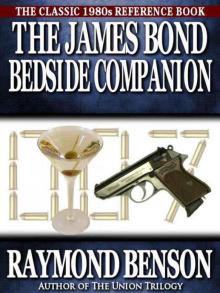 The James Bond Bedside Companion
The James Bond Bedside Companion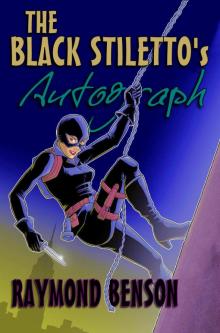 The Black Stiletto's Autograph
The Black Stiletto's Autograph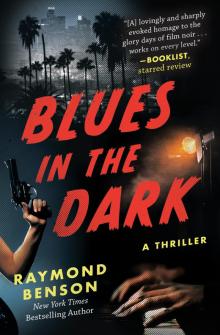 Blues in the Dark
Blues in the Dark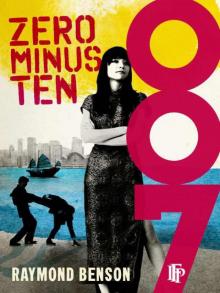 Zero Minus Ten
Zero Minus Ten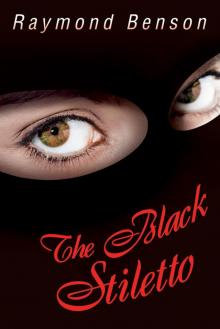 The Black Stiletto
The Black Stiletto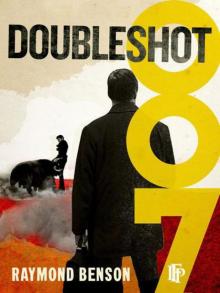 Doubleshot
Doubleshot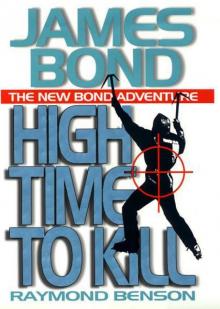 High Time To Kill rbb-3
High Time To Kill rbb-3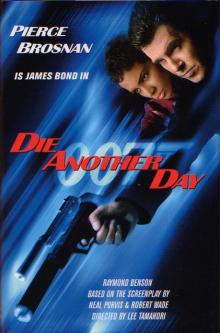 Bond Movies 07 - Die Another Day
Bond Movies 07 - Die Another Day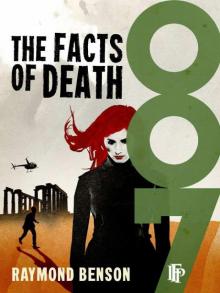 The Facts Of Death
The Facts Of Death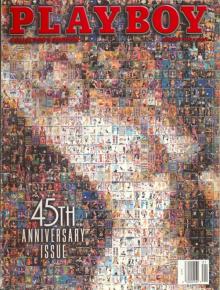 Midsummer Night's Doom
Midsummer Night's Doom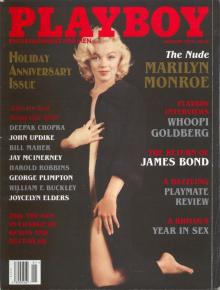 Blast from the Past
Blast from the Past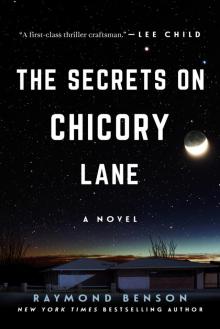 The Secrets on Chicory Lane
The Secrets on Chicory Lane High Time To Kill
High Time To Kill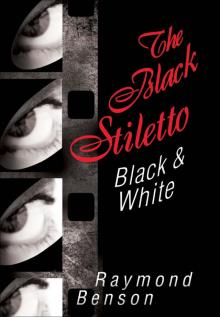 The Black Stiletto: Black & White
The Black Stiletto: Black & White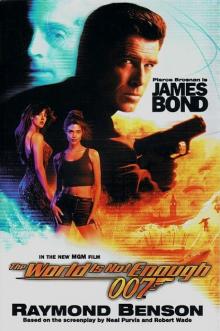 The World Is Not Enough jb-1
The World Is Not Enough jb-1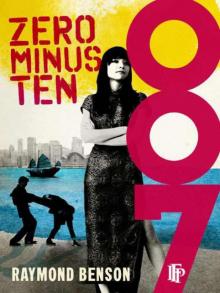 Zero Minus Ten rbb-1
Zero Minus Ten rbb-1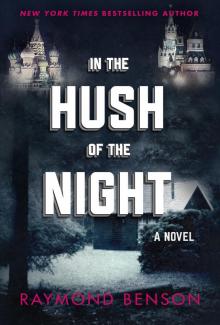 In the Hush of the Night
In the Hush of the Night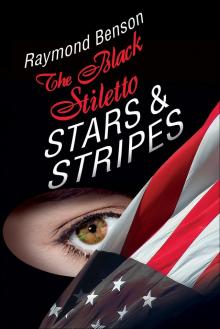 The Black Stiletto: Stars & Stripes
The Black Stiletto: Stars & Stripes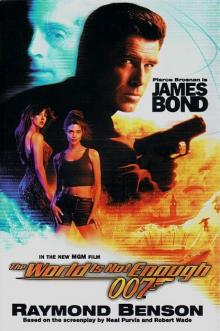 Bond Movies 06 - The World Is Not Enough
Bond Movies 06 - The World Is Not Enough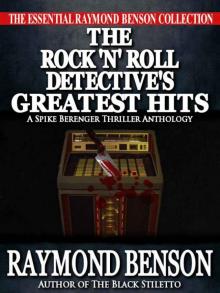 The Rock 'n Roll Detective's Greatest Hits - A Spike Berenger Anthology
The Rock 'n Roll Detective's Greatest Hits - A Spike Berenger Anthology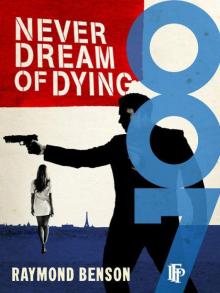 Never Dream Of Dying
Never Dream Of Dying